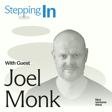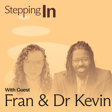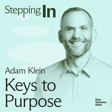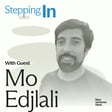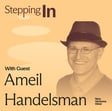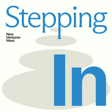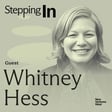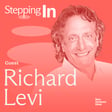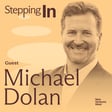Become a Creator today!Start creating today - Share your story with the world!
Start for free
00:00:00
00:00:01

Gateways to Conversation
Apple PodcastsAmazon MusicYouTubeSpotify
In this episode of Stepping In, Adam Klein speaks with Professional Coaching Course graduate Kelly McGannon, who works in Washington, D.C., coaching and teaching mindfulness to US government leaders.
In this episode, she talks with Adam about how today’s political and cultural climate offers opportunities to have new conversations with each other and ourselves.
Here are some of the topics covered in the Stepping In podcast episode Gatewa
Transcript
00:00:11
Speaker
This
Introduction to Episode 14
00:00:12
Speaker
is Adam Klein, Global Graduate Director, faculty member at New Ventures West. This is episode 14 of our podcast, Stepping In, a podcast where we delve into how integral coaching can address some of the most pressing issues we face as individuals, communities, and stewards of our planet.
Meet Kelly McGannon
00:00:30
Speaker
For this episode, I'm sitting down with Kelly McGannon. Kelly is a graduate of the professional coaching course who coaches leaders and teaches mindfulness in the United States government in Washington, DC.
Impact of Politics on Conversations
00:00:41
Speaker
We spoke about how current political and cultural events are offering us a chance to deepen into conversations with our neighbors, coworkers, and ourselves. Our conversation began as Kelly shared her experience of living in Washington, DC during a time of so much change. So, and sitting in DC, Washington, DC, in many regards
00:01:05
Speaker
I consider it as the epicenter of the political change that's moving through. It seems to be the shockwaves that reverberate through the rest of the country. They seem to originate here in some cases. And it's been a remarkable thing to have so much change fluctuate through this space. And it's been neat to watch it.
00:01:30
Speaker
And what are you finding for you situated there in the midst of this? What are you paying attention to that has you keep moving forward?
Navigating Emotional Reactions to Politics
00:01:40
Speaker
So for me, in the beginning of it all, I felt a lot of fear at first and a lot of anxiety. What is this? To me, when the current administration came in, it felt very trickster-ish.
00:01:56
Speaker
trickster doesn't behave like you expect trickster to behave. I think about that as an archetype.
00:02:02
Speaker
I think when tricksters are put, things feel very scattered, things feel very influx. So for me, it's required me to recognize the emotions that I'm feeling. Oh look, there's fear. Oh look, there's crazy anxiety. Oh look, there's despair or depression or sadness, grief. Oh look, there's hope. You know, just watching the different emotions as they're cycling through. And at first, I
Courage in Diverse Conversations
00:02:28
Speaker
used to get really hooked on one. Maybe it was anger.
00:02:31
Speaker
Or maybe it was just grief. But I found that that actually disconnected me from the conversation. I wasn't moving. I think conversations are fluid. And I think it takes a lot of courage to have a conversation. Because your chances are you're going to hear something you don't want to hear. So what that's encouraged me to do is to move with the energies that are out there and to try to stay very grounded in all of it.
00:03:00
Speaker
You know, to recognize I'm in my body. Wow, this is the experience of this emotion. So many people who have ever traveled on this planet before me have felt fear. This is what fear feels like. And I can be with fear. I try not to get stuck in it because I lose that conversation with myself then, right, when fear has me in its grip.
00:03:23
Speaker
I love this word. Sorry. I love this word you're bringing in like conversation. Allow us to have conversations and even this last part that you said, like conversations with yourself. And I think, so my sense is this may be something that's been lost in our culture to some degree, the capacity to have a conversation.
Reclaiming True Conversation
00:03:51
Speaker
And part of the way that I'm holding that is
00:03:54
Speaker
what allows us to like really have a back and forth like let me share what I am seeing and then listen to the way that you see it and take in what you say rather than just sort of biding time to say what I want to say to convince you of what I see versus really being engaged in a back and forth. Right. I think
00:04:22
Speaker
That's a lost art. And I'm hoping that we can reclaim some of it. We start with ourselves. This is the conversation you can most certainly have is with yourself, not bypass what's going on inside self. And I think that's a really fertile practice ground for taking it into a larger public discourse. If you and I are having a conversation, and you think apples are the best fruit, and I say, no, no, no, Adam, it's oranges.
00:04:50
Speaker
I'm never probably going to change your mind about apples. You're probably not going to change my mind about oranges. So what I can do is get really curious about why apples are so meaningful to you and try to get into your world a little bit, you know, to open up the world and to be in it as you are in it and to do the same for you with my world of oranges. And I think curiosity helps us get there.
00:05:19
Speaker
And in your, so where you are in the East coast and working in the government, are you seeing more conversations happening?
Fear in Government Discussions
00:05:30
Speaker
Like, what are you noticing there? That's difficult, I think, because, you know, again, I'm only one person so I can comment on some of the things I see and some of the fear mongering that goes around, you know, EPA, for example.
00:05:45
Speaker
that what the press says to say about the EPA is that there's a lot of fear. People feel like they can't be very expressive or I have a view about climate control, for example, and maybe or climate change and maybe the administration doesn't agree with my view. And so I think in the beginning, there's a lot of fear. I think the problem with that is if you if you're not courageous to have the conversation that starts to slide and leak and other aspects of life. I think now with
00:06:15
Speaker
I kind of, I joke sometimes with people that it seems like in DC, marches are du jour, right? There's something moving through this city all the time. And you can look at those as lots of microcosms of conversations happening. Or maybe it's the first step into a conversation. People are just showing up and it's learning how to pause and instead of shouting at each other, really listening to each other. And I think that requires an ability to open up a heart.
00:06:46
Speaker
and to hear things you may not want to hear or to hear things that maybe make you afraid or you want to judge or make a story about. I
Opening Dialogue on Societal Pain
00:06:56
Speaker
was listening a couple of months ago to Christa Tippec on being.org. She interviewed a civil rights activist Ruby Sales. Ruby Sales was talking about the question to ask people is where does it hurt?
00:07:13
Speaker
because that question opens up a really interesting conversation. And I think what we see, story I make up anyway, is that we're looking at a lot of hurt that's out there. And the question we're not actually asking is, where does it hurt for you? What is this about? Yeah. Well, that's a- Yeah.
00:07:37
Speaker
It's a powerful question, and it's not one that you would ask glibly, right? Like, where does it hurt? Right, right. But if you go into the old myths, like I love the old Celtic stories, and I love the story of the Fisher King. And when Parcival goes and finds the Fisher King, the story goes that one of the questions is, you know, where does it hurt? Where's the Fisher King in pain? And it's that wound that needs healing.
00:08:08
Speaker
So I feel like DC is a really interesting petri dish for experiments and conversation right now. Yeah. Both in the microcosm and the macro. And I think you could, if you don't live in the city, chances are there are, there's some mirroring going around in other cities and other locations and other locales. Yeah.
Mindfulness in Government
00:08:37
Speaker
And what do you like to kind of do you mentioned like conversations with yourself and how you're staying? Well, I would say it was like open to what's happening. What do you notice saying as you do that with people that you work with? What's the impact of staying in it? I noticed that there is a softening. So for example, I teach a lot of
00:09:05
Speaker
meditation and mindfulness to government employees. And one of the things that we often will throw into the teaching schedule is the meta meditation, you know, the loving kindness. We do it with self. And what I note is a lot of softening, you know, people get teary eyed or
00:09:26
Speaker
They just put a hand on their heart. You can watch almost that their whole skeletal system melts a little bit. The rigidity starts to drain away. And we'll often say to people, find someone you don't know and share the experience. What's going on for you? To the degree you feel comfortable, share it with someone else. And what's been very interesting is it's opened up some, again, really insightful conversations. And I think what people, at least the feedback that I hear is, oh,
00:09:56
Speaker
It's not just me. You understand this feeling too. And there's usually some laughter around it or, oh my gosh, I'm so glad I met you because you're always thinking it was just me. And I think what happens in moments like that is it doesn't matter what color you are, what party you affiliate yourself with, you see the commonality and you're entering it in a soft way. And I think from that place, there's a lot that's possible.
00:10:25
Speaker
but you also have to do it with yourself. No, you can't, if you can't access parts of you, you won't be able to access parts of other people. Right. Right. That's what I believe. Yeah. Well to me, um, hearing you talk, it sounds like when you're making this more personalized, so to a person and listening to them that it humanizes it,
00:10:52
Speaker
And so when we first, like you're saying, you know, we have to deal with ourselves when we recognize that, Oh, I'm a human being. And that comes with certain things, like an emotional world and ways that I experienced that. And if I can connect to my own humanity.
00:11:09
Speaker
then when I talk to you, I can see you as another human being and have some resonance with that. Or maybe not even resonance, and this is beyond sort of ideological belief, but just resonance in that you're a human being also having an experience. Right. Right. I mean, I think the job of being human, the more I feel into it, it's to know my own humanity and then to see the humanity in other people.
00:11:38
Speaker
And sometimes it's easier to see the humanity in others than it is in ourselves. And one can be one door back to yourself. And I really think a lot of it comes down to that curiosity and the validation, tell me more. Conversations don't go very far if we immediately judge or we immediately back away or we collapse into an emotional state.
00:12:08
Speaker
It takes a lot of grounding and a willingness to listen, to hear someone else's world and to ask for more. Oh, you want to throw an apple at me because I like oranges so much. Tell me about that. Tell me more. What's that about? Because I think the more we ask from a place of curiosity, the more people are willing to give.
00:12:35
Speaker
And I think in that generosity, if you want to flip it like that, there's a really nice way into a deeper space without so many defenses to have that conversation.
Self-awareness in Listening
00:12:51
Speaker
And that's really difficult in an environment where there's cyber bullying, where people are trolling. I mean, I was reflecting, I'm so glad I am not 10 years old and growing up in this environment right now because the volley that comes back is a hundredfold and it's people you don't know. Right.
00:13:21
Speaker
In these interactions that you're having where you're talking about really listening, what have you noticed that helps you be able to do that, to listen? I think it's a couple of things. One, I think it requires self-awareness.
00:13:42
Speaker
Like maybe this isn't the right time for me to listen to you because I know inside myself I'm triggered. I'm just flying a thousand miles a minute right now. I'm not in a space where I can really listen to you. And I think the self-awareness piece is helpful because it allows you to say, wow, what you're saying to me is really important. And I want to give you my undivided attention and really listen to you. Like with ears on my heart,
00:14:09
Speaker
But right now, I just don't have that capacity. Can I come find you again soon? And if you do find that you do have space and time, it's slowing yourself down enough and trusting yourself enough to not miss what's not being said. So I think about New Ventures West and the platform and some of the teaching modalities.
00:14:37
Speaker
And I think about, you know, when you're in a coaching moment with somebody, you trust your whole body, your whole self to pick up the conversation. And so to really listen to someone, I think it's bringing that coaching ability, you know, that ability to listen with the whole body into all conversations and not just say, Oh, I'm just going to listen with my ears.
00:15:04
Speaker
or I'm going to half listen and make up some stories about what I want to say or hope to say or want to forget not to say. What kind of conversations are you noticing happening inside the government? You know, I think some of the conversations I've been privy to have been people just going about their work.
00:15:35
Speaker
The conversation is I'm working for the American people and I want to do a good job. I am keeping my own political opinions out of this because my job is to protect the constitution. Um, it's been a lot of just notes to the keyboard and just working hard on what you've been called to do in public service and staying out of the fray. I think that's what I've seen.
00:16:05
Speaker
Hey, I hear the conversation, but I also have to have a conversation with myself about the work that I'm doing and who I'm really working for and what kind of service am I providing right now? I haven't heard inside the government, I haven't heard a lot of political discussions. I feel like I hear those on the streets and in the coffee houses and in the book clubs. I don't hear that in the office.
00:16:35
Speaker
Yeah,
Media's Influence on Awareness
00:16:36
Speaker
I think for me, it kind of brings up what is it that we have in our lives that we're putting our attention on? And then how is that affecting how we respond? So if I read this book or if I watch this show or if I watch this TV show or if I interact with this person,
00:16:56
Speaker
Invariably, it's going to elicit some kind of response from me. So if we start paying attention to the inputs that we have or the people we interact with or even the thoughts that we think that our responses can change. Absolutely. So just hearing you say, you know, so, um, you know, I'm going to pay attention to what I'm here to do. That's what I'm going to pay attention to and how that just sort of can organize us as a person and call us forward into the world in a particular way.
00:17:27
Speaker
Absolutely. I think it's a little bit of what are we consuming right now? Right. I mean, one conversation I hear a lot of is how the heck do I get off social media? How do I create more time for myself for the conversations that matter? And not consume the conversations that leave me feeling physically ill, mentally disturbed, and depleted of energy.
00:17:54
Speaker
So it's been interesting. I've been watching, you know, through my coaching practice, through coaching people in the government and in the DC Metro area. It's been how do I come back to myself? How do I come back to the consistency within myself as in maybe I just need to feel my own breath coming in and out of my body because that's the level of the conversation I need to have right now to remind me I'm human. And then I've also heard
00:18:23
Speaker
how do I get out of the habit of trolling Facebook or looking at Instagram with all its polish? How do I come to what feels real for me?
Genuine Interactions vs. Social Media
00:18:37
Speaker
Because this stuff doesn't feel real for me anymore. So it's been very interesting to watch more craft things spring up. I've noted that there's been more
00:18:49
Speaker
small communities for me and you know maybe they've always been there and now I'm just noting them but more people opening up their homes for the potluck dinner more people saying tell me a good news story anything tell me a joke just tell me something that reminds me tell me something that's beautiful and what's real for you right now and it's been tell me your secrets of getting off social media
00:19:21
Speaker
It's very much in the news these days. And in people's conversations, I think as a result of it, like you're saying. Right. I think one thing I heard a lot of and I'm sure this is probably true for most of the country was that the Thanksgiving right after the election was difficult for a lot of people because they got into a lot of fights around the election results.
00:19:45
Speaker
And, you know, I think what I've also heard from some people in my friend's circle, it's been, gosh, I can't even look at social media anymore because it just so disgusts me with the kind of vitriol and acerbic comments that people are making to each other and the shaming and judging. I just, it feels toxic. I don't want to be a part of it. So it makes me wonder if part of this, if part of what's happening right now is
00:20:14
Speaker
Wow, it's forcing us to have a real conversation with ourselves and what we value, what's real and true for us. And to get rid
Personal Rituals for Self-awareness
00:20:23
Speaker
of the stuff that isn't or to limit our exposure or our energy that goes toward it. I feel like maybe what's happening is it's making us wake up.
00:20:35
Speaker
Yeah. If we can't, I want to move into this because it keeps coming up the conversation with ourselves. When you say that, what does that mean?
00:20:48
Speaker
So it means a couple of things. I look for access points in my day where I can have conversations with myself. So for example, I've had a long time dream practice where every morning, even if I can't remember, I try to write down everything I can recall about my dreams, even if it's, I just can't remember, but I know I dream.
00:21:09
Speaker
And I look for things inside those dreams that inspire me or that I feel triggered about. And I think that's a window to have a conversation right there. What part of me wants to have a conversation about that? And then I think about it when I drive into work. I think about all the people around me.
00:21:31
Speaker
And I think about it when I am with other people at work or receiving, or I'm by myself, but I'm receiving an email from somebody or a phone call from somebody. And I'm noticing that I have a physical sensation shining off. My hands want to go into fists. That's interesting. Or my vocal area feels constricting.
00:21:55
Speaker
Or wow, my heart feels like it's melting or glowing or I feel like a looseness of my body. I think all of those are opportunities to have a conversation with myself. But I generally try to go to the body. I feel like the body is signaling something to me. I want to get curious about what that is and what it's trying to tell me. Yeah.
00:22:21
Speaker
Yeah, it's a beautiful word, curious. That's what I was thinking. It's a way of being curious with ourselves. Yeah. Some people get conversations with yourself. What are you talking about? I know. These voices in your head that are talking to each other. What's this airy fairy woo woo? Yeah.
00:22:39
Speaker
But this really important thing that sometimes I think it's lost in the busyness of life of, you know, I'm noticing that I feel tight in my neck.
Recognizing and Managing Bias
00:22:49
Speaker
What is going on there? Like, why do I feel so tense? And asking the question then can prompt a different way of being with it and seeing like, what is that coming from? Or where is that coming from? Or like you were saying, you know, all the other sensations that you mentioned in the body. And then asking ourselves, what's going on there?
00:23:10
Speaker
and how this can support, you know, to connect it to what we were saying earlier, being in conversation with someone else. So you're saying something to me and I'm like, I noticed I'm really getting like warm and hot and angry here. But being in the conversation of like, why, what is going on with what's going on there? Like what's this reaction that I'm having to what you're saying?
00:23:36
Speaker
So the value in being able to pay attention to ourselves and know what's going on so that it's not the reaction that comes forward, but something else. Right. And I think there's also something to be said for the self-awareness piece of like, wow, Adam, I'm having like a 45 degree Fahrenheit kind of day with like showers and, you know, F5 category winds.
00:24:04
Speaker
And you're over there and you're like, I don't know what you're talking about, Kelly, because it's 85 and sunny and perfect, lovely California. Right. And if I am not conscious of how I'm experiencing myself, I could just project that all over you. And I could see you through that lens. That's not even you. It's really me. And that is not a fair conversation, right? Right.
00:24:29
Speaker
And so I think part of it is the more you converse with yourself, the more you get to know all your neighborhoods and all the doors and all of the denizens of your own being, the weather, it enables you to more clearly be with people who are not you. Yeah. I've also been practicing with in conversations with other people,
00:24:57
Speaker
listening to yes, what they're saying, but also asking myself, what is it that they care about that has them talk about this? So what is the value that they're trying to bring forward or what is the thing that they're trying to protect or what is it that they really care about that has them have this point of view or talk about the thing that they're talking about so they can get more in touch with like, who's this person behind this? They're not just the content of what they're saying. Yeah.
00:25:27
Speaker
Yeah, and I would even add on to that. So I'm making up some stories about what I think's going on for this other person. Are these stories true for that person? And then I'll ask them, is this true for you? And sometimes it's, yeah, spot on. And sometimes it's like, nope. Right, but we assume it's true. Yeah, I'm like, wow, I'm glad I checked out my inner narrative there. It's like thank you for like blah, blah, blah, right?
00:25:57
Speaker
Right. Yes. This is such a beautiful one because we all do it where somebody says something and then all of a sudden we have a whole story about why that is. Oh, we never asked them about it because we're just so certain that our story is correct. I know. It's a very powerful feeling because it's like, I know everything. Yeah, it's right. I know who you are and I know why you're saying that. Yes. Please agree with me about my story about you. Yeah. Um,
00:26:24
Speaker
Yeah, so it's a really humbling thing to realize, wow, I don't always know it all and I get things wrong too. Huh, isn't that interesting? Just like everyone else. Yeah. I think it's a really normalizing thing. Well, what allows you to be so, what I'll use
Vulnerability and Influential Thinkers
00:26:45
Speaker
is like vulnerable with that to say, you know, here's the story that I have and I want to check in with you about that.
00:26:52
Speaker
Like that's a move of putting yourself out there. Yeah. I think a lot of people would be like, I would never do that. What if they do something that I don't like or they disagree with me or I know, you know, I think this is where we get really lucky to live in the time we're living in, because we have some remarkable thinkers and activists and speakers and, and people who are just out in the community having conversations like this. I think about the work of Brené Brown.
00:27:21
Speaker
whose work is on vulnerability, putting yourself out there. I think sometimes it comes from trial and error. It's funny, you know, I've met some people who just say almost in the first meeting, I just want to have a real conversation. I don't want to go through like all the pleasantries of like, how are you? I'm fine. How are you? I'm fine. Let's talk about the weather. And then you kind of circle into the meat of it. Some people just want to cut right to the chase.
00:27:50
Speaker
But that requires a great deal of vulnerability and courage and patience for your talking partner to want to get there. Right. But for me, it's always, it's trusting my body and the physical sensations that come forward. That's the fuel for me for conversations. So if I note, for example, wow, I just want to give a little bit more.
00:28:22
Speaker
I have to do it with myself. I have to say it for myself. Wow, I'm hearing what you're saying to me and I'd love to know more. Or I'm listening to you and I'm just, wow, I'm just really feeling that. I think I feel too, I think people get that. I think they, I think most of the time people can meet you in that space or
00:28:50
Speaker
If they can't, they at least know that it exists so that when they're ready, they can meet you there. I'm Adam Klein and thanks for joining us. Please spread the news by sharing this podcast on social media and let us know what you think by emailing us at SteppingIn at NewVenturesWest.com. Until next time, take care.
00:29:18
Speaker
you
